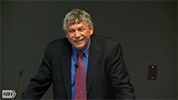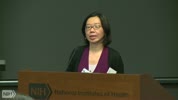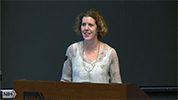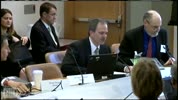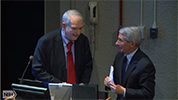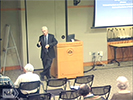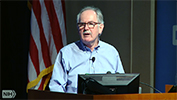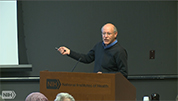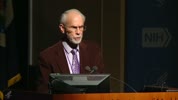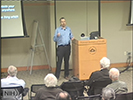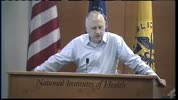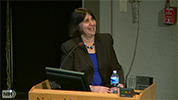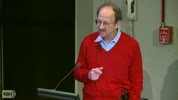-
- NIH VideoCast - Anti-viral resident memory CD8 T cells
-
- - David Masopust, Ph.D., University of Minnesota (2015/03/31)
- - Category : Immunology
- Immunology Interest Group
Dr. David Masopust is the front-runner in our race to understand T cell memory formation and maintenance. His break-through studies on migration and effector function of memory CD8 T cells have re-shaped the field, and his current work on viral and bacterial vaccines that target tissue resident T cells has opened up new avenues in cellular immunology. Dave???s fascination with T cell memory started with his PhD work in Leo Lefrancois??? lab at U. Conn, where he studied the migration and tissue distribution of memory cells. It was his pioneering work during that time that resulted in the landmark paper in Science, describing a new T cell subset that we now know as Tissue resident memory cells or TRM. Dave continued his interest in T cell memory during his post-doctoral training in Rafi Ahmed???s lab at Emory, where he studied memory formation upon viral infection and also got interested in the mechanisms that regulate the size and the repertoire of the memory T cell pool. These questions remained his major interests even after establishing his own lab at University of Minnesota, and he already provided us with new insights by demonstrating that the size of the memory CD8 T cell compartment is flexible and not static as previously proposed. Dave???s research on T cell memory helped shaping new paradigms in immunology, such as the identification of tissue resident memory cells that provide immediate and local protection at the site of infection. The importance of his research is illustrated by his many awards, including the 2009 NIH Director???s New Innovator Award, The Beckman Foundation Young Investigator Award, and the American Society for Microbiology Young Investigator Award.
For more information go to http://sigs.nih.gov/immunology/Pages/default.aspx
NIH VideoCast - Anti-viral resident memory CD8 T cells
-
- NIH VideoCast - NIH Pi Day 2015
-
- - Eric S. Lander, Ph.D., Director of the Broad Institute of MIT and Harvard (2015/03/31)
- - Category : Conferences
- The National Institutes of Health will celebrate Pi Day 2015 with a series of events on Pi Day Eve (March 13, 2015) to promote data science, which combines statistics, computer science, and the biological sciences.
The inaugural NIH Data Science Lecture at this year`s Pi Day will feature Dr. Eric Lander, director of the Broad Institute of MIT and Harvard, speaking about the quantitative sciences in biomedicine. Dr. Lander is the founding director and serves as a core member of the Broad Institute of MIT and Harvard. One of the principal architects of the Human Genome Project, he and his colleagues have a long-standing interest in applying genomics to understand the molecular basis of human physiology and disease. Dr. Lander also serves as co-chair of the President`s Council of Advisors on Science and Technology, which advises President Obama on issues that are scientific and technical in nature.
For more information go to http://nihpiday.nih.gov
NIH VideoCast - NIH Pi Day 2015
-
- NIH VideoCast - Reproducibility of Data Collection and Analysis: Modern Technologies in Structural Biology: Potentials and Pitfalls
-
- - Michael Gottesman, In챗s Chen, Wei Yang, Wayne Hendrickson, Valda J. Vinson, Sriram Subramaniam, Ed Egelman, Milka Kostic, Ad Bax, Peter Wright, Sandy Markey, David R. Goodlet (2015/03/31)
- - Category : Conferences
- This is the second of three workshops sponsored by the NIH Office of the Director on the important topic of reproducibility, the subject of recent editorials in leading scientific journals.
The purpose of these workshops is to educate the NIH intramural research community about what advanced technologies can accomplish and the kinds of reproducibility problems that can arise; provide a cautionary note to scientists who hope to use but are inexperienced with various new modeling techniques; and educate others who are attempting to interpret results in the literature.
We have invited several world-class scientists who will speak about important technologies in structural biology. In addition, we have invited editors from scientific journals covering structural biology to moderate sessions and discuss issues with data reproducibility in the scientific literature.
For more information go to http://wals.od.nih.gov/reproducibility
NIH VideoCast - Reproducibility of Data Collection and Analysis: Modern Technologies in Structural Biology: Potentials and Pitfalls
-
- NIH VideoCast - Epigenetics in Learning and Memory
-
- - J. David Sweatt, Ph.D., Professor, University of Alabama at Birmingham (2015/03/31)
- - Category : BSSR - Behavioral and Social Sciences
- BSSR Lecture Series
The NIH Office of Behavioral and Social Science Research presents the lecture Epigenetic mechanisms in memory formation by Dr. J. David Sweatt, University of Alabama at Birmingham.
Dr. Sweatt???s presentation is part of the 2014-2015 Behavioral and Social Sciences Research Lecture Series to promote open and engaged discussion about cutting edge research in the behavioral and social sciences field.
Regulation of chromatin structure and control of direct methylation of DNA are the principal mechanisms of epigenetic regulation. This presentation will address the idea that conservation of epigenetic mechanisms for information storage represents a unifying model in biology, with epigenetic mechanisms being utilized for cellular memory at levels from behavioral memory to development to cellular differentiation. Do epigenetic mechanisms operate in behavioral memory formation, including reward-based learning? We have generated several lines of evidence that support this idea that I will discuss.
1. Contextual fear conditioning and reward conditioning trigger alterations in hippocampal DNA methylation and histone post-translational modifications.
2. Inhibitors of DNA methylation block both hippocampal LTP and associative learning in vivo.
3. Remote contextual fear memory is associated with persisting changes in DNA methylation in the Anterior Cingulate Cortex, and DNMT inhibition can reverse established remote memory.
4. Histone acetylation increases in memory formation, and histone deacetylase (HDAC) inhibitors enhance both memory formation and hippocampal long-term potentiation.
5. Histone subunit exchange controls long-term and remote memory stabilization for threat learning.
For more information go to http://obssr.od.nih.gov
NIH VideoCast - Epigenetics in Learning and Memory
-
- NIH VideoCast - Neural signals for exploration and navigation in the medial temporal lobe
-
- - Elizabeth Buffalo, Ph.D., University of Washington (2015/03/31)
- - Category : Neuroscience
- Neuroscience Seminar Series
The focus of Dr. Buffalo lab???s research is to contribute to a better understanding of the neural mechanisms involved in learning and memory. Using neurophysiological techniques, they record simultaneously from multiple electrodes in the hippocampus and surrounding cortex in awake, behaving monkeys. They investigate how changes in neuronal activity correlate with the monkey`s ability to learn and remember. They are particularly interested in the activity of neuronal networks that underlie learning and memory processes. They use spectral analysis techniques to investigate the role of oscillatory activity and neuronal synchronization in cognition.
Previous studies have identified a system of structures in the medial temporal lobe that is critical for declarative memory, the ability for the conscious recollection of facts and events. This system of structures includes the hippocampus and the surrounding cortical regions. These are the structures that are affected first in Alzheimer`s disease, and lesions of these structures produce profound memory deficits. Their research focuses on potential mechanisms by which these structures set up new memories and how these structures might work together during memory formation and retrieval. Along with modulations in spiking activity of individual neurons, they investigate the role of synchronous oscillatory activity across networks of neurons.
NIH VideoCast - Neural signals for exploration and navigation in the medial temporal lobe
-
- NIH VideoCast - Muscular Dystrophy Coordinating Committee Meeting - March 2015
-
- - NIH (2015/03/31)
- - Category : Advisory Board Meetings
- The Muscular Dystrophy Community Assistance, Research, and Education Amendments of 2001 ("MD-CARE Act"; P.L. 107-84) authorized the establishment of the Muscular Dystrophy Coordinating Committee (MDCC) to coordinate activities across the National Institutes of Health (NIH) and with other Federal health programs and activities relevant to the various forms of muscular dystrophy. The MDCC is a Congressionally mandated committee designed to coordinate research activities across NIH and with other Federal health programs and activities relating to the various forms of muscular dystrophy, including Duchenne, myotonic, facioscapulohumeral muscular dystrophy and other forms of muscular dystrophy. The purpose of this meeting is to bring together the committee members to update one another on individual agency efforts and to discuss revision of the Action Plan for the Muscular Dystrophies.
NIH VideoCast - Muscular Dystrophy Coordinating Committee Meeting - March 2015
-
- NIH VideoCast - A Tribute to Marshall Nirenberg
-
- - NLM History of Medicine Division, NIH (2015/03/31)
- - Category : Special
- On Tuesday, March 17, 2015, the National Library of Medicine (NLM) hosts a public program in the Lister Hill Auditorium entitled ???A Tribute to Marshall Nirenberg.??? The occasion will mark the NLM???s acquisition of Marshall Nirenberg???s Nobel Prize and certificate through a generous donation from Dr. Myrna Weissman, who will offer remarks at the event. The program will also recognize the publication of Dr. Frank Portugal???s new book about Dr. Nirenberg, ???The Least Likely Man: Marshall Nirenberg and the Discovery of the Genetic Code??? (MIT Press, February 2015) with a talk by the author, as well as a formal announcement of a new NLM Turning the Pages adaptation of the Nirenberg genetic code charts held by NLM, which are also featured in Profiles in Science. The Turning the Pages adaptation was curated by David Serlin, PhD, of the University of California, San Diego; the Turning the Pages system was developed by the Communications Engineering Branch of the Lister Hill National Center for Biomedical Communications under the direction of George Thoma, PhD. Dr. Serlin and Dr. Thoma will both speak at the event.
NIH VideoCast - A Tribute to Marshall Nirenberg
-
- NIH VideoCast - Covering the Disease of the Century: A Journalists Personal Perspective on AIDS, 1981-2015
-
- - Lawrence K. Altman, M.D., Medical Writer and The Doctor`s World Columnist, The New York Times; Senior Scholar, Woodrow Wilson International Center for Scholars; Clinical Professor of Medicine, New York University (2015/03/31)
- - Category : James C. Hill - HIV/AIDS Research
- Physician and journalist Lawrence K. Altman, M.D., will deliver this year???s James C. Hill Memorial Lecture, ???Covering the Disease of the Century: A Journalist???s Personal Perspective on AIDS, 1981???2015.??? Dr. Altman will discuss his decades of reporting on HIV/AIDS, beginning with the 1981 appearance of the first U.S. cases of illness caused by the then-unknown virus.
Dr. Altman is a medical writer for The New York Times, where from 1969 to 2008 he was one of the few physicians employed full time for a daily newspaper. He continues to report on a variety of medical topics for the Times. Dr. Altman also writes ???The Doctor???s World,??? a column that appears in the science section of the newspaper. He is a clinical professor of medicine at New York University and senior scholar at the Woodrow Wilson Center in Washington, DC, where he is writing a book on the health of political leaders. Dr. Altman authored ???Who Goes First? The Story of Self-Experimentation in Medicine.??? He also has written for scholarly publications on subjects such as viral encephalitis and canine cadaver blood. Dr. Altman holds medical licenses in California, New York, and Washington state.
Dr. Altman wrote the Times??? first article on HIV/AIDS, ???Rare cancer seen in 41 homosexuals,??? published on July 3, 1981. The article describes an outbreak of ??????41 cases of a rare and often rapidly fatal form of cancer??????its cause unknown. After years of writing numerous articles on HIV/AIDS, Dr. Altman penned, ???30 Years In, We are Still Learning from AIDS??? for the Times. That article looks back on the earliest cases of AIDS, the medical community???s reaction and response to the HIV/AIDS pandemic, its social implications, and the scientific, medical, and public health challenges that remain.
The annual Dr. James C. Hill Memorial Lecture is dedicated to the former NIAID deputy director. Dr. Hill helped build the institute???s HIV/AIDS research program during the early years of the epidemic and was instrumental in educating the public and government officials on the emerging threat of AIDS.
NIH VideoCast - Covering the Disease of the Century: A Journalists Personal Perspective on AIDS, 1981-2015
-
- NIH VideoCast - Demystifying Medicine 2015 - Alcohol: How Does it Do the Things it Does?
-
- - George Koob, PhD, NIAAA, NIH and Bin Gao, MD, PhD, NIAAA, NIH (2015/03/31)
- - Category : Demystifying Medicine
- The 2015 Demystifying Medicine Series, which is jointly sponsored by FAES and NIH, will begin January 6th and includes the presentation of patients, pathology, diagnosis and therapy in the context of major disease problems and current research. Primarily directed toward Ph.D. students, clinicians and program managers, the course is designed to help bridge the gap between advances in biology and their application to major human diseases. Each session includes clinical and basic science components presented by NIH staff and invitees. All students, fellows and staff are welcome, as well.
For more information go to http://demystifyingmedicine.od.nih.gov/
NIH VideoCast - Demystifying Medicine 2015 - Alcohol: How Does it Do the Things it Does?
-
- NIH VideoCast - CC Grand Rounds: The Trans-NIH Center for Human Immunology, Autoimmunity, and Inflammation (CHI): A Systems Approach to Understanding Human Immunity
-
- - Neal Young, MD, MACP Chief, Hematology Branch, NHLBI, NIH and Director, Trans-NIH Center for Human Immunology, Autoimmunity, and Inflammation (CHI); John Tsang, Ph.D.Chief, Systems Genomics and Bioinformatics Unit, Laboratory of Systems Biology, NIAID, NIH and Head, Computational Systems Biology, CHI; Robert Nussenblatt, MD, MPH, Chief, Laboratory of Immunology, NEI, NIH and Associate Director, CHI (2015/03/31)
- - Category : Clinical Center Grand Rounds
- CC Grand Rounds
For more information go to http://www.cc.nih.gov/about/news/grcurrent.html
NIH VideoCast - CC Grand Rounds: The Trans-NIH Center for Human Immunology, Autoimmunity, and Inflammation (CHI): A Systems Approach to Understanding Human Immunity
-
- NIH VideoCast - Phenotypical Cohort Retrieval Using the Multi-Institutional Pediatric Epilepsy Decision Support (MiPeds) System
-
- - John Pestian, Ph.D., MBA, Cincinnati Children`s Hospital Medical Center (2015/03/31)
- - Category : Special
- National Library of Medicine Informatics Lecture Series:
The Multi-Institutional Pediatric Epilepsy Decision Support (MiPeds) system provides point-of-care surveillance of phenotypically similar pediatric epilepsy patients using the electronic health records (EHR) from Cincinnati Children???s Hospital Medical Center, Children???s Hospital of Philadelphia, and Children???s Hospital of Colorado. Using this near real-time cohort retrieval system, the three organizations can review similarities and differences in clinical measures like: medication side-effects, types of seizures, seizure frequency, quality of life, neurological abnormalities, and so forth. This talk will describe the successes and challenges of developing MiPeds. Examples will focus on: aligning the research and clinical needs of each organization with data standards, factors that influence centralization and decentralization, automated method of de-identification, the usefulness of I2B2, developing collaborative measures of data quality and quality of care, searching and visualization. Efforts to generalize this novel approach to other neuropsychiatric disease will be described as well.
NIH VideoCast - Phenotypical Cohort Retrieval Using the Multi-Institutional Pediatric Epilepsy Decision Support (MiPeds) System
-
- NIH VideoCast - Secretarys Advisory Committee on Human Research Protections (SACHRP) - Day 1
-
- - SACHRP (2015/03/31)
- - Category : Advisory Board Meetings
- SACHRP provides expert advice and recommendations to the Secretary, through the Assistant Secretary for Health, on issues and topics pertaining to or associated with the protection of human research subjects. The committee is composed of 11 appointed voting members, with additional ex-officio members from Common Rule government agencies. SACHRP presently has two working subcommittees, the Subpart A Subcommittee (SAS) and the Subcommittee on Harmonization (SOH). The March 2015 meeting will include reports from both subcommittees, including discussion of the following topics: the Newborn Screening Saves Lives Reauthorization Act of 2014; the draft NIH Policy on the Use of a Single IRB for Multi-site Research; the draft FDA guidance, ???General Clinical Pharmacology Considerations for Pediatric Studies for Drugs and Biological Products???; CLIA and HIPPAA issues surrounding the return of research results; and informed consent. Time is allotted on both days for public comment
For more information go to http://www.hhs.gov/ohrp/sachrp/index.html
NIH VideoCast - Secretarys Advisory Committee on Human Research Protections (SACHRP) - Day 1
-
- NIH VideoCast - Inflammation, dysbiosis and chronic disease
-
- - Richard A. Flavell, Ph.D. FRS, Yale School of Medicine (2015/03/31)
- - Category : WALS - Wednesday Afternoon Lectures
- Wednesday Afternoon Lecture Series
Dysregulation of the immune system and host-microbiota interaction has been associated with the development of a variety of inflammatory as well as metabolic diseases such as obesity and diabetes. Recent studies in Dr. Flavell`s laboratory have elucidated the important function of inflammasomes as steady-state sensors and regulators of the gut microbiota. Mice with a disrupted inflammasome pathway have been shown to develop a colitogenic microbial community, which results in exacerbation of chemical-induced colitis and diet-induced steatohepatitis, obesity and type 2 diabetes.
These disease phenotypes have been associated with dysbiosis resulting from the expansion of "pathobionts" which are believed to be causally driving pathogenesis. A key issue is to identify and isolate such problematic organisms. Dr. Flavell will discuss a new way that he and his colleagues have developed to identify and isolate such organisms from mice and humans. Using this approach, his lab has shown that predicted "pathobionts" from human patients with inflammatory bowel diseases (IBD) that they isolated by this approach can drive susceptibility to severe IBD in germ-free mice, whereas predicted harmless microbes from the same patients do not. These data suggest a significant involvement of such microbes in human disease.
For more information go to http://wals.od.nih.gov
NIH VideoCast - Inflammation, dysbiosis and chronic disease
-
- NIH VideoCast - Cortisol Dysregulation and Alcoholism: Consequence, Correlation or Causality
-
- - Gary S. Wand, M.D., The Johns Hopkins University School of Medicine (2015/03/31)
- - Category : Special
- 7th Annual Jack Mendelson Honorary Lecture
NIAAA established the Jack Mendelson Honorary Lecture Series as a tribute to Dr. Jack Mendelson, who made remarkable scientific contributions to the field of clinical alcohol research. The purpose of this honorary lecture series is to highlight clinical/human research in the alcohol field by an outstanding investigator who has made significant and long-term contributions to our understanding of alcoholism susceptibility, alcohol???s effects on the brain and other organs, and the prevention and treatment of alcohol use disorders. NIAAA is pleased to present this series of scientific lectures to acknowledge the advances researchers are making in a wide range of alcohol-related areas of clinical research, and to honor the memory of an individual whose exciting and pioneering research with human alcoholics remains relevant today.
Dr. Wand???s research has advanced our understanding of the genetic and environmental determinants of the stress response and has elucidated how excessive stress hormone production may contribute to neurobiological conditions such as alcohol or drug disorders.
Some of Dr. Wand???s seminal discoveries include identifying unique pharmacological responses to naloxone in individuals at increased risk for alcohol use disorders, identifying specific hormonal responses in subjects with alcohol use disorders, and characterizing human brain neurochemical changes using imaging in subjects with substance use disorders.
Dr. Wand is studying the epigenetic modulation of stress and cortisol exposure in rodent and human models, based on the hypothesis that specific epigenetic events affect how much cortisol an individual produces, which in turn influences dopamine transmission.
Dr. Wand received his medical degree and subsequent training in internal medicine from the George Washington University. Following post-doctoral training in Endocrinology and Metabolism at The Johns Hopkins University School of Medicine, he was a fellow in the peptide laboratories of Richard Mains, Ph.D. and Betty Eipper, Ph.D. in JHU???s Department of Neuroscience. Dr. Wand then joined the faculty of the Johns Hopkins University School of Medicine.
In 2000, NIAAA and the NIH honored Dr. Wand with a 10-year Merit Award to continue his research on the role of the HPA axis in alcoholism. He has also received numerous local and national ???Best Doctor??? awards. Dr. Wand is the author of more than 175 articles and chapters and is on the editorial board of several journals.
For additional information about the lecture see:
http://www.niaaa.nih.gov/about-niaaa/our-work/research-portfolio/projects-initiatives/keller-and-mendelson-honorary-lecture
NIH VideoCast - Cortisol Dysregulation and Alcoholism: Consequence, Correlation or Causality
-
- NIH VideoCast - Learning to Predict: Studies of Neural Circuits in Fish and Flies
-
- - Larry Abbott, Ph.D., Columbia University (2015/03/31)
- - Category : Neuroscience
- Neuroscience Seminar Series
Dr. Abbott Lab???s research involves the computational modeling and mathematical analysis of neurons and neural networks. Analytic techniques and computer simulation are used to study how single neurons respond to their many synaptic inputs, how neurons interact to produce functioning neural circuits, and how large populations of neurons represent, store, and process information. Areas of particular interest include spike-timing dependent forms of synaptic plasticity, the roles of neuronal adaptation and synaptic modification taking place over multiple time scales in sensory processing and memory, and the dynamics of internally generated activity and signal propagation in large neural networks.
Long-term changes in synaptic strength can depend on the relative timing of pre- and postsynaptic action potentials, with important functional implications. Spike-timing-dependent synaptic plasticity (STDP) can generate a balance of excitation and inhibition, support the learning of temporal sequences, enhance responses to temporally correlated inputs, and equalize synaptic efficacies over complex dendrites. STDP is just one of many forms of synaptic plasticity that act over a wide range of timescales. They have shown that having multiple timescales of plasticity is critical for enhancing memory capacity and protecting memories from "over-writing". They continue to explore the implications of multi-timescale adaptation and plasticity for sensory processing and learning.
NIH VideoCast - Learning to Predict: Studies of Neural Circuits in Fish and Flies
-
- NIH VideoCast - Public Meeting for Oral Testimony on the Scientific Report of the 2015 Dietary Guidelines Advisory Committee
-
- - HHS Office of Disease Prevention and Health Promotion (2015/03/31)
- - Category : Advisory Board Meetings
- This meeting will provide an opportunity for public oral testimony on the Scientific Report of the 2015 Dietary Guidelines Advisory Committee (DGAC). The DGAC Report submitted to the Secretaries of Health and Human Services and of Agriculture, will provide the scientific basis for the 2015 Dietary Guidelines for Americans policy document developed by the Federal government with consideration of public comments.
Registration is required
http://www.dietaryguidelines.gov
NIH VideoCast - Public Meeting for Oral Testimony on the Scientific Report of the 2015 Dietary Guidelines Advisory Committee
-
- NIH VideoCast - Demystifying Medicine 2015 - Vision: Cerebral Pathways and Diseases
-
- - David Leopold, PhD, NIMH, NIH, Emily Chew, MD, NEI, NIH and Edmond Fitzgibbon, MD, NEI, NIH (2015/03/31)
- - Category : Demystifying Medicine
- The 2015 Demystifying Medicine Series, which is jointly sponsored by FAES and NIH, will begin January 6th and includes the presentation of patients, pathology, diagnosis and therapy in the context of major disease problems and current research. Primarily directed toward Ph.D. students, clinicians and program managers, the course is designed to help bridge the gap between advances in biology and their application to major human diseases. Each session includes clinical and basic science components presented by NIH staff and invitees. All students, fellows and staff are welcome, as well.
For more information go to http://demystifyingmedicine.od.nih.gov/
NIH VideoCast - Demystifying Medicine 2015 - Vision: Cerebral Pathways and Diseases
-
- NIH VideoCast - Secretarys Advisory Committee on Human Research Protections (SACHRP) - Day 2
-
- - SACHRP (2015/03/31)
- - Category : Advisory Board Meetings
- SACHRP provides expert advice and recommendations to the Secretary, through the Assistant Secretary for Health, on issues and topics pertaining to or associated with the protection of human research subjects. The committee is composed of 11 appointed voting members, with additional ex-officio members from Common Rule government agencies. SACHRP presently has two working subcommittees, the Subpart A Subcommittee (SAS) and the Subcommittee on Harmonization (SOH). The March 2015 meeting will include reports from both subcommittees, including discussion of the following topics: the Newborn Screening Saves Lives Reauthorization Act of 2014; the draft NIH Policy on the Use of a Single IRB for Multi-site Research; the draft FDA guidance, ???General Clinical Pharmacology Considerations for Pediatric Studies for Drugs and Biological Products???; CLIA and HIPPAA issues surrounding the return of research results; and informed consent. Time is allotted on both days for public comment
For more information go to http://www.hhs.gov/ohrp/sachrp/index.html
NIH VideoCast - Secretarys Advisory Committee on Human Research Protections (SACHRP) - Day 2
-
- NIH VideoCast - CC Grand Rounds: Gaucher Disease and Parkinsonism: Using Induced Pluripotent Stem Cells to Probe the Link Between a Rare and a Common Disorder and Clinical and Molecular Characteristics of Erdheim-Chester Disease
-
- - Ellen Sidransky, MD, Senior Investigator and Chief, Section on Molecular Neurogenetics, Medical Genetics Branch, NHGRI, NIH and Juvianee Estrada-Veras, MD, Staff Clinician, Human Biochemical Genetics Section, Medical Genetics Branch, NHGRI, NIH (2015/03/31)
- - Category : Clinical Center Grand Rounds
- CC Grand Rounds
For more information go to http://www.cc.nih.gov/about/news/grcurrent.html
NIH VideoCast - CC Grand Rounds: Gaucher Disease and Parkinsonism: Using Induced Pluripotent Stem Cells to Probe the Link Between a Rare and a Common Disorder and Clinical and Molecular Characteristics of Erdheim-Chester Disease
-
- NIH VideoCast - National Cancer Institute Town Hall Meeting - March 2015
-
- - Dr. Harold Varmus, Director, National Cancer Institute, NIH (2015/03/31)
- - Category : Special
- Dr. Harold Varmus, Director at National Cancer Institute (NCI) is convening his final Town Hall Meeting on Wednesday, March 25, 2015, from 2:00 to 3:00 p.m. in Lipsett Amphitheater(Clinical Center, Building 10). Dr. Varmus will discuss his initiatives that shaped his tenure at NCI and will revisit the ambitions he set when he first became the Director.
NIH VideoCast - National Cancer Institute Town Hall Meeting - March 2015




